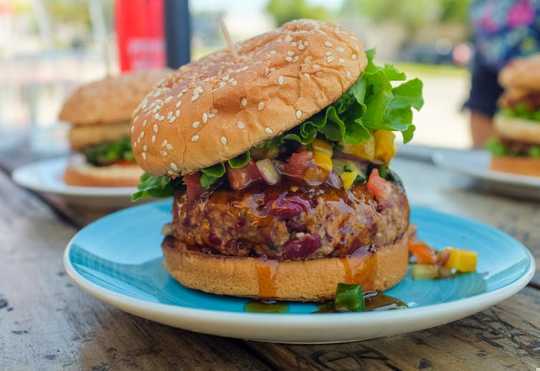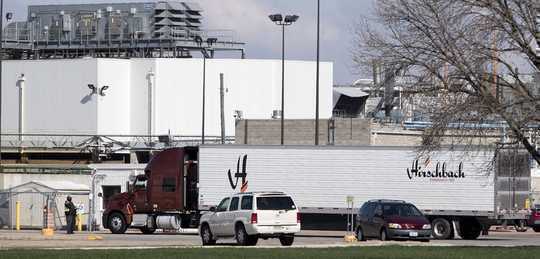 Now might be a good time to lean towards a plant-based diet — like this vegetarian burger pictured — both for our health and that of meat plant workers. (Unsplash)
Now might be a good time to lean towards a plant-based diet — like this vegetarian burger pictured — both for our health and that of meat plant workers. (Unsplash)
President Donald Trump’s executive order mandating meat processing plants to stay open, despite growing coronavirus cases at meat plants, is rife with problems. It endangers the lives of thousands of workers and their communities.
An estimated 5,000 meat workers have contracted COVID-19, at least 20 have died from it and many communities near these plants are coronavirus hotspots. One hundred USDA meat inspectors have contracted the disease.
Putting thousands more in harm’s way by keeping the plants open requires careful cost-benefit analysis — assuming that there’s any gain that is worth lost lives. In this case, the answer to this problem is clear, at least to the country’s approximately 16.5 million vegetarians: the order is much ado about nothing. No one is going to starve without meat.
 Meat plants across North America have closed; some for deep cleaning and some because of new coronavirus cases. Here Tyson Fresh Meats’ beef processing complex in Dakota City, Neb. (Tim Hynds/Sioux City Journal via AP)
Meat plants across North America have closed; some for deep cleaning and some because of new coronavirus cases. Here Tyson Fresh Meats’ beef processing complex in Dakota City, Neb. (Tim Hynds/Sioux City Journal via AP)
Get The Latest By Email
A shortage in meat supply is certain, even if meat processing plants can and do comply with the order, because of recent plant closures. The good news is that this shortage might lead to silver linings: a healthier population and a healthier planet.
Plant-based diets are healthier
In the short term, more nutritious, plant-forward diets might contribute to better general health outcomes. Many of the underlying factors in the most serious and deadliest cases of COVID-19 are food-related: obesity, diabetes, high blood pressure and cardiovascular disease.
The racial disparities in these conditions — Black people suffer from them at higher rates than white people and most other racial groups — contribute to the racial disparities in COVID-19 deaths. They also explain racial disparities in food-related illnesses and deaths during non-pandemic times.
One of the tools we have to combat these disparities is better access to healthy food. If Trump wants to solve the problem of a dwindling food supply due to dangerous working conditions at meat processing plants, he could focus on ensuring that healthy alternatives make their way to consumers’ plates.
Powerful lobbies
Because of the meat and other industries’ powerful lobbies, beans, lentils, fruits and vegetables receive minimal subsidies under the new Farm Bill. Meat, on the other hand, gets a big boost.
Diverting financial support from a bloated industry to ones that are essential for human health, diverse agricultural practices and sustainability would represent a win for everyone. So why is the U.S. administration pretending that keeping the meat supply flowing is vital to consumers?
Eating meat is a choice. Vegetarians make up five per cent of the population. Many more Americans have chosen to make “meat substitutes” a regular part of their diets. These choices divert some profits away from the meat industry, which has fought back by convincing state legislatures to enact laws against using words like “meat” and “sausage” to describe plant-based products.
Trump’s order demonstrates that the industry has a similar influence over the executive branch.
Why and how to cook beans
What do consumers stand to lose in the face of a disrupted meat supply? They will suffer temporarily from a lack of choice. But that is something we all have to live with — in every aspect of our lives — as we work together to combat the spread of the virus.
There is also concern that people will go hungry because they don’t know how to cook beans or lentils. Here is how to do it: Soak beans for eight hours (overnight is easiest); rinse and add fresh water to beans at a ratio of about one part bean to four parts water and boil; simmer until beans are soft; add salt. Eat.
The meat industry, not consumers, has pushed for the executive order. It’s unlikely that very many people, if asked the question, “Are you willing to let someone die so you can enjoy bacon?” would say yes.
This era calls for flexibility, grace, compassion and creativity. The rising popularity of vegan TikTok videos speaks to a new openness to culinary discoveries.
There are other potential benefits of permanently reducing meat consumption. They include the reduction of worker exploitation in a dangerous environment, softening the impact of climate change and saving animals’ lives. Arguments based on animal welfare are inevitably unpopular. But when animal and human welfare converge, we should pay attention.
Trump’s order is premised on a lie: that a meat shortage is a food shortage. It is not. Shifting our diets away from meat will have immediate health benefits and ones that will last beyond this crisis. Let’s recognize this moment as an opportunity to save lives, now and in the future.![]()
About The Author
Andrea Freeman, Associate Professor of Law, William S. Richardson School of Law, Author of Skimmed: Breastfeeding, Race, and Injustice, University of Hawaii
This article is republished from The Conversation under a Creative Commons license. Read the original article.
books_food







